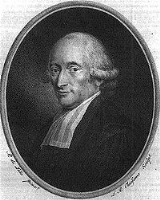
Hendrik Constantijn Cras
Encyclopedia

Amsterdam
Amsterdam is the largest city and the capital of the Netherlands. The current position of Amsterdam as capital city of the Kingdom of the Netherlands is governed by the constitution of August 24, 1815 and its successors. Amsterdam has a population of 783,364 within city limits, an urban population...
) was a Dutch jurist and city librarian
Librarian
A librarian is an information professional trained in library and information science, which is the organization and management of information services or materials for those with information needs...
of Amsterdam.
He studied law in Leiden. For nearly fifty years, beginning in 1771, he taught all fields of legal study at the Athenaeum Illustre in Amsterdam. His work mirrors the decline of the significance of Roman law
Roman law
Roman law is the legal system of ancient Rome, and the legal developments which occurred before the 7th century AD — when the Roman–Byzantine state adopted Greek as the language of government. The development of Roman law comprises more than a thousand years of jurisprudence — from the Twelve...
in legal practice. Beginning his career as an adherent of Roman law, Cras became a fundamental supporter of natural law
Natural law
Natural law, or the law of nature , is any system of law which is purportedly determined by nature, and thus universal. Classically, natural law refers to the use of reason to analyze human nature and deduce binding rules of moral behavior. Natural law is contrasted with the positive law Natural...
and legal codification towards the end of the 18th century. Noted for his focus on general principles of law, his lengthy publications on the principles of equality
Egalitarianism
Egalitarianism is a trend of thought that favors equality of some sort among moral agents, whether persons or animals. Emphasis is placed upon the fact that equality contains the idea of equity of quality...
and liberty
Liberty
Liberty is a moral and political principle, or Right, that identifies the condition in which human beings are able to govern themselves, to behave according to their own free will, and take responsibility for their actions...
had nonetheless little lasting impact.
In 1798, Cras rose to prominence as the leading member of a commission charged with drafting national codes of law. The draft codes, published in 1804, appeared overly dogmatic and were never made into law.

